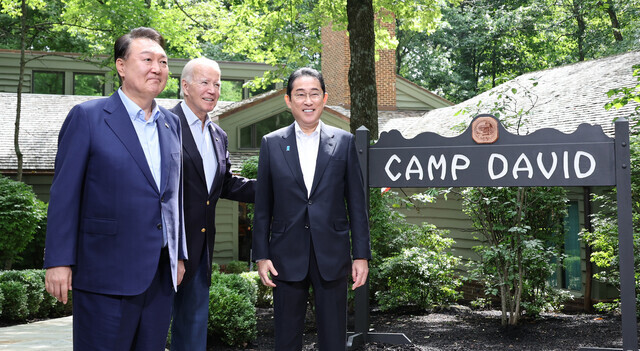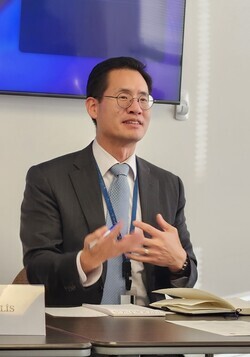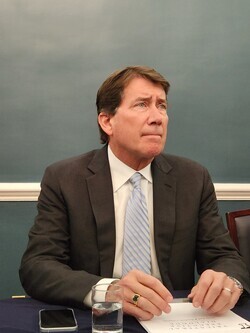hankyoreh
Links to other country sites 다른 나라 사이트 링크
Months after Camp David, questions about benefits of SK-US-JP cooperation for Seoul remain

The most significant geopolitical change in Asia in 2023 has been the rapid progress of the trilateral cooperation between the US, South Korea and Japan. Since the Camp David summit on Aug. 18, the three countries have accelerated their cooperation on security, economy, supply chains and cybercrime.
On Saturday, the security chiefs of the US, South Korea and Japan met in Seoul to launch a series of new initiatives aimed at directly blocking North Korea’s main source of funding for its nuclear program: hacking.
Nearly four months have passed since the Camp David summit, and it’s time to look at how trilateral cooperation is being carried out, as well as how South Korea should evaluate such progress, and what challenges remain to be addressed.
From Nov. 28 to Dec. 8, the Hankyoreh joined a joint team of South Korean and Japanese reporters to meet with government officials, military officials, and experts from the three countries in Washington, Hawaii, Japan, and Seoul. These meetings showed that as the architect of this trilateral cooperation, the United States has been working on elaborate plans to contain the rise of China by working with its two allies in East Asia.
From South Korea’s perspective, many questions remain about whether trilateral cooperation is addressing the pressing challenges of North Korea’s quickly escalating nuclear capabilities and the potential for conflict between the two Koreas.
The threat of China or North Korean nukes?Even though America’s Democratic and Republican parties are highly polarized, all politicians and experts in the US are unanimous when it comes to the need to contain China. It is as if the understanding of China as a “threat” is the glue that holds the partitions of the US together.
While the US focuses on the strategic goal of containing China through trilateral cooperation, the North Korea issue has been pushed to the back burner. Russia’s invasion of Ukraine, Israel’s ongoing bombardment of Gaza, and the escalating threats across the Taiwan Strait have also taken attention away from the North Korea issue.
There is a growing realization among experts in Washington that the current policy toward North Korea is not working and that the situation is getting worse, said Andrew Yeo, SK-Korea Foundation chair at the Brookings Institution’s Center for East Asia Policy Studies. While the Biden administration has said it is open to dialogue with North Korea whenever, Yeo noted that North Korea has yet to respond.
Yeo believes that dialogue with North Korea is necessary, but that it is highly unlikely that the Biden administration will take the initiative.

The political scientist said that while the US should not give up on denuclearization as an end goal, many experts believe there is a need to maintain contact with North Korea and at least have dialogue to reduce risk and stabilize tension.
However, from a political perspective, Yeo said, the Biden administration is juggling so many foreign policy issues at once that he’s doubtful of its capacity to try something dramatically different and new. With an election coming up, the Biden administration doesn’t want to bring North Korea to the negotiating table only to end up with no clear results, he added.
US-South Korea-Japan versus China-North Korea-RussiaUS government officials and experts have rebutted concerns that China has different interests from North Korea and Russia, and that stronger trilateral cooperation between South Korea, the US, and Japan is bringing North Korea, China, and Russia closer together, adding extra pressure to the situation on the Korean Peninsula.
“I'm not sure President Xi and the Chinese Foreign Ministry and security advisers think what just happened between Russia and North Korea is a good thing,” said Ambassador Rahm Emanuel, the US envoy to Japan, adding that there are limits to the three’s trilateral cooperation.
Emanuel is correct in his analysis that China is not happy about the North Korea-Russia ties, and that such ties were growing closer long before the US, South Korea, and Japan strengthened trilateral cooperation at the Camp David summit. This is due to the fact that North Korea, which was struggling after the failed Hanoi summit in 2019, found a breakthrough in its strategic ties with Russia, which needed North Korea’s help after invading Ukraine in 2022.
The US officials and experts we spoke to acknowledged North Korea’s advancements in satellite and submarine technology through military cooperation with Russia to be a very serious threat. However, no significant and effective solutions to this problem are being put in place.
While suggesting seeking a solution through diplomacy with China, Yeo said there remains a great deal of skepticism within the Biden administration about whether China will cooperate with the US on North Korea.

Noting arguments that there are signs Xi wants to cooperate with the US, perhaps even about North Korea, following last month’s summit between Xi and Biden, Yeo asserted that Xi would ultimately prefer that North Korea not strengthen its nuclear capabilities, and China has not been welcoming to Russia’s cooperation with North Korea.
At this point, Yeo suggested, there may be ways to work with China to prevent Russia from sending more supplies and technology to North Korea. But so far, there is a lot of skepticism within the Biden administration about whether China has the political will to do anything meaningful in this regard.
If Trump returns to the White HouseWith the US presidential election less than a year away, most polls show former President Donald Trump leading Biden. Anxiety and concern about Trump’s possible return have cast a dark shadow over Washington. However, US politicians and experts are trying to reassure South Korea and Japan that while Trump’s return may slow the pace of trilateral cooperation, he’s unlikely to be able to completely reverse it.
Noting that Trump traveled to the Indo-Pacific more than any other region of the world during his presidency, US Sen. Bill Hagerty, who is known to be close to the former president, suggested that concerns about his stance on alliance in the region could be overblown.
Rob York, the director of regional affairs at the Pacific Forum, a Hawaii-based think tank, commented that another Trump administration in the White House could likely threaten to weaken the US-South Korea alliance, he’s similarly likely to hit continual roadblocks.
Trump emphasizes that competing with China is his goal, said York, and he cannot accomplish that goal by weakening ties with allies and partners.
To make it harder for Trump to reverse trilateral cooperation if he returns to the White House, many experts emphasized the need to “institutionalize” trilateral cooperation in a number of ways, including strengthening diplomacy between the three countries’ legislatures, and building personal networks among their heads of state.
The snubbing of historical issues between South Korea and JapanIn Washington and Tokyo, Yoon is often cited as the “hero” who enabled trilateral cooperation between South Korea, the US and Japan.
Having served as the US ambassador to Japan, Hagerty said he considers the historical disputes between South Korea and Japan to be the biggest stumbling blocks to South Korea-US-Japan cooperation.

For dozens of years, the US has wanted to see South Korea and Japan develop closer relations, Hagerty said, noting that both Yoon and Japan’s Prime Minister Fumio Kishida have expressed intentions to improve relations in spite of the difficult historical and political challenges.”
Regarding the historical disputes between Seoul and Tokyo, Washington has adopted the stance of “leave the past in the past and focus on the future.” The US does not consider the significance and sensitivity of such historical issues, particularly from the perspective of a country that lived under Japan’s colonial rule.
Washington has no concern for Yoon’s unilateral push to have a third party reimburse victims of forced labor instead of penalizing the Japanese companies and parties responsible. The US is not interested in South Korea’s demands that Japan meet it halfway. Emanuel, the current US ambassador to Japan, said that South Korea and Japan should directly settle historical disputes and “talk to each other [rather] than through the United States,” effectively removing Washington from the equation.
Emanuel simply acknowledged that “a lot of work, constantly” is necessary to settle historical disputes. He also emphasized the cordial relations between young Japanese and Koreans and the surges in bilateral tourism following the relaxation of COVID restrictions.
Yet Washington and Tokyo seem extremely concerned that Seoul will experience a sudden shift in relations with Tokyo if Yoon’s successor comes from across the political aisle.
Cooperation for whose benefit?
At a meeting of the South Korean, US and Japanese national security advisers, the three countries agreed to enhance trilateral cooperation on aiding developing countries, combating fake news from Russia, China and North Korea, and counteracting election interference from Moscow, Beijing and Pyongyang.
As the architect of the trilateral alliance, the US wants its major allies to perform bigger roles. Seoul came away from the meeting with a heap of promises and duties, but it remains to be seen whether South Korea can strategically utilize the trilateral framework to solve issues that are critical to Korea’s interests.
By Park Min-hee, editorial writer
Please direct questions or comments to [english@hani.co.kr]

Editorial・opinion
![[Editorial] Perilous stakes of Trump’s rhetoric around US troop pullout from Korea [Editorial] Perilous stakes of Trump’s rhetoric around US troop pullout from Korea](https://flexible.img.hani.co.kr/flexible/normal/500/300/imgdb/original/2024/0509/221715238827911.jpg) [Editorial] Perilous stakes of Trump’s rhetoric around US troop pullout from Korea
[Editorial] Perilous stakes of Trump’s rhetoric around US troop pullout from Korea![[Guest essay] Preventing Korean Peninsula from becoming front line of new cold war [Guest essay] Preventing Korean Peninsula from becoming front line of new cold war](https://flexible.img.hani.co.kr/flexible/normal/500/300/imgdb/original/2024/0507/7217150679227807.jpg) [Guest essay] Preventing Korean Peninsula from becoming front line of new cold war
[Guest essay] Preventing Korean Peninsula from becoming front line of new cold war- [Column] The state is back — but is it in business?
- [Column] Life on our Trisolaris
- [Editorial] Penalties for airing allegations against Korea’s first lady endanger free press
- [Editorial] Yoon must halt procurement of SM-3 interceptor missiles
- [Guest essay] Maybe Korea’s rapid population decline is an opportunity, not a crisis
- [Column] Can Yoon steer diplomacy with Russia, China back on track?
- [Column] Season 2 of special prosecutor probe may be coming to Korea soon
- [Column] Park Geun-hye déjà vu in Yoon Suk-yeol
Most viewed articles
- 1Nuclear South Korea? The hidden implication of hints at US troop withdrawal
- 2Korea likely to shave off 1 trillion won from Indonesia’s KF-21 contribution price tag
- 3With Naver’s inside director at Line gone, buyout negotiations appear to be well underway
- 4[Editorial] Perilous stakes of Trump’s rhetoric around US troop pullout from Korea
- 5‘Free Palestine!’: Anti-war protest wave comes to Korean campuses
- 6In Yoon’s Korea, a government ‘of, by and for prosecutors,’ says civic group
- 7[Photo] ‘End the genocide in Gaza’: Students in Korea join global anti-war protest wave
- 8How many more children like Hind Rajab must die by Israel’s hand?
- 9Behind-the-times gender change regulations leave trans Koreans in the lurch
- 10‘We must say no’: Seoul defense chief on Korean, USFK involvement in hypothetical Taiwan crisis